 Petzlover
Petzlover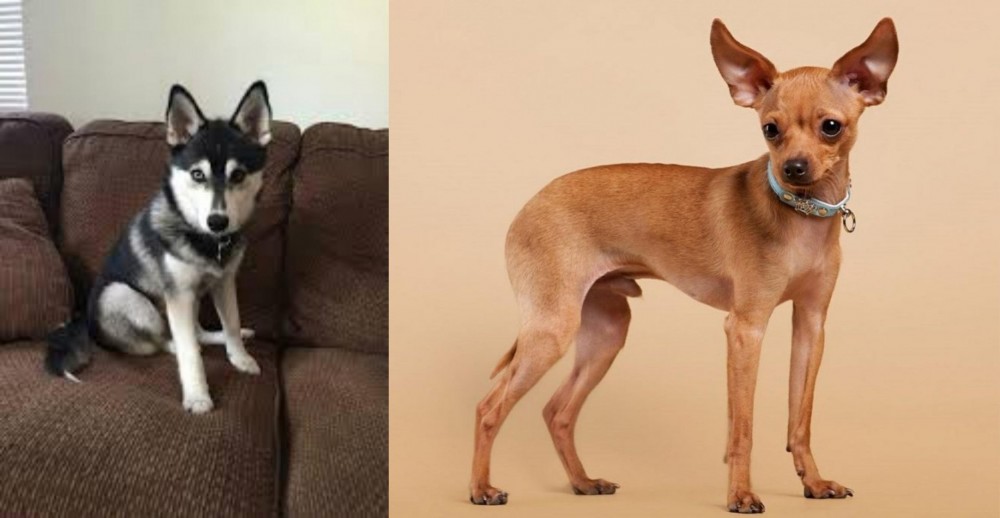 Pomsky is originated from United States but Russian Toy Terrier is originated from Russia. Pomsky may grow 12 cm / 5 inches higher than Russian Toy Terrier. Pomsky may weigh 11 kg / 25 pounds more than Russian Toy Terrier. Both Pomsky and Russian Toy Terrier has almost same life span. Both Pomsky and Russian Toy Terrier has almost same litter size. Pomsky requires Moderate Maintenance. But Russian Toy Terrier requires Low Maintenance
Pomsky is originated from United States but Russian Toy Terrier is originated from Russia. Pomsky may grow 12 cm / 5 inches higher than Russian Toy Terrier. Pomsky may weigh 11 kg / 25 pounds more than Russian Toy Terrier. Both Pomsky and Russian Toy Terrier has almost same life span. Both Pomsky and Russian Toy Terrier has almost same litter size. Pomsky requires Moderate Maintenance. But Russian Toy Terrier requires Low Maintenance
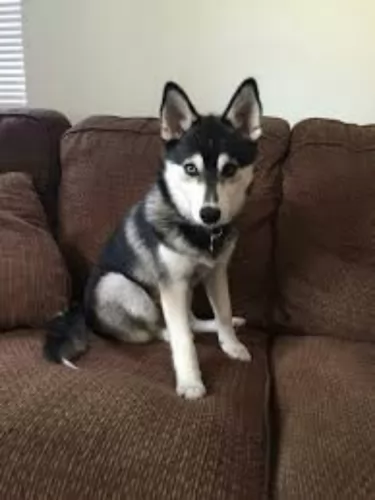 Pomskies are such cute little wolf-like dogs, you just wish they’d been around much sooner.
Pomskies are such cute little wolf-like dogs, you just wish they’d been around much sooner.
They’re a fairly new addition to the breed of designer dogs, believed to have originated in 2009, in the United States. Today they are a well known, and sought after designer dog breed.
They are a cross between the Pomeranian and a Siberian Husky. As a designer dog breeds, the Pomeranian Husky isn’t recognized by the American Kennel Club. There is a Pomsky Club of America and they are wanting to get the breed registered.
 The Russian Toy Terrier is one of the dog breeds that hails from Russia in the 20th century. The Russian nobility fancied these little dogs as companions but also as they were useful for catching rats and being watchdog.They would set off an alarm with their barking.
The Russian Toy Terrier is one of the dog breeds that hails from Russia in the 20th century. The Russian nobility fancied these little dogs as companions but also as they were useful for catching rats and being watchdog.They would set off an alarm with their barking.
It is believed that the Manchester Terrier and the English Toy Terrier were the foundation breeds for this dog.
They are available in smooth and long-haired varieties. The breed has recently been recognized by the UK Kennel Club but is not yet recognized by the American Kennel Club.
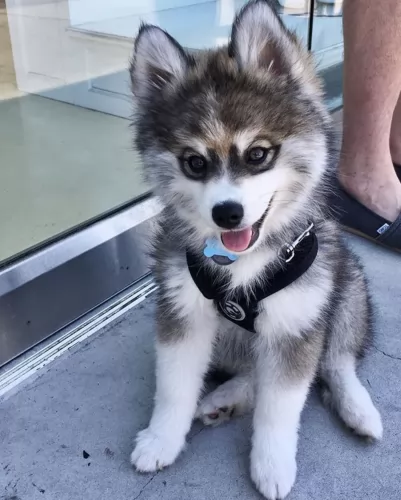 Just like most hybrid breeds, the Pomsky can have mixed looks – taking more after one or the other dog.
Just like most hybrid breeds, the Pomsky can have mixed looks – taking more after one or the other dog.
They can stand between 25 to 40cm in height and weigh between 9 to 14kg. The dog looks like a small Husky, but even so, in one litter, there can be some variety between the puppies in terms of looks and temperament.
The dogs have a soft double coat that keeps the dog comfortable in icy temperatures. Coat colors vary and the coats can be grey and white, a reddish brown or even solid white.
You’ll find your Pomsky to be amusing and entertaining as he is quite clownish.He fits quite easily into life in the city or in the countryside.
Wherever you are, part of being a responsible dog owner includes taking him for walks and seeing that he gets enough exercise. He is a vocal dog, which might not be good in the city if you live near to your neighbors as he can howl and whine quite a bit.
Training and socialization will be important for him, particularly as he tends to be nervous around strangers. Socialization makes him obedient, well balanced an well behaved.
They are playful, loving dogs and intelligent too so you won’t have trouble getting him trained and socialized.
 The Russian Toy Terrier is a petite dog and is inclined to be a fragile dog breed. It belongs to the toy group. It is also known as the Russian Toy Terrier or the Russkiy Toy.
The Russian Toy Terrier is a petite dog and is inclined to be a fragile dog breed. It belongs to the toy group. It is also known as the Russian Toy Terrier or the Russkiy Toy.
The dog’s small size means it is ideal for living in the city or the countryside.
He measures between just 20 and 28cm and weighs between just 1kg and 3kg.
The dog has a small head with big eyes and ears which are large ad erect. The tail was always traditionally docked to give it a cute, compact look, but these days it is left long.
You also get a long-coated dog and the smooth coated dog. The long coated variety has a lot of feathering around the tail, legs and ears. Colors of the coat can be solid red, brown and tan, black and tan or greyish and tan.
This little dog is full of character and is bold and cheerful. He is such a loyal, devoted little dog and small though he is he is territorial, protecting and guarding his owner. It is such a sociable little dog, devoted to his human family, while being wary of strangers.
Even a small dog like this will need training and socialization as he can become yappy and clingy if he is constantly piked up and petted.
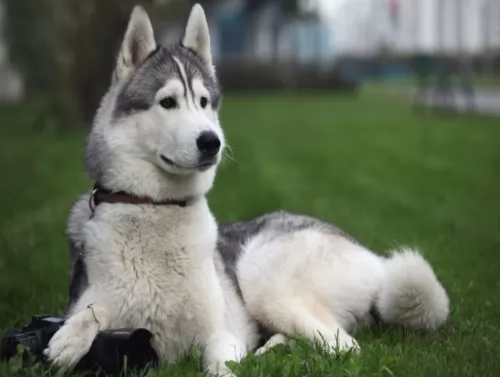 A Pomsky is such a great pet to have. They’re intelligent dogs and respond well to training and socialization.
A Pomsky is such a great pet to have. They’re intelligent dogs and respond well to training and socialization.
They’re playful, confident and full of life and want nothing more than to be an active member of the family. He will need quite a bit of exercise and will love playing with the children in the home.
Provide him with love and care, and you can count him in as a faithful, loving pet and companion.
 The Russian Toy is a small, feisty dog with long legs and huge upright ears. He is intelligent too. Don't let his fine structure deceive you as he is far more robust and tough than he looks.
The Russian Toy is a small, feisty dog with long legs and huge upright ears. He is intelligent too. Don't let his fine structure deceive you as he is far more robust and tough than he looks.
He is a great playmate for disciplined, respectful children who know how to be kind to animals. Wild, unruly kids could so easily accidentally break one of his tiny little legs during rough play.
He loves his human family though and is guaranteed to make you an excellent little pet and companion.
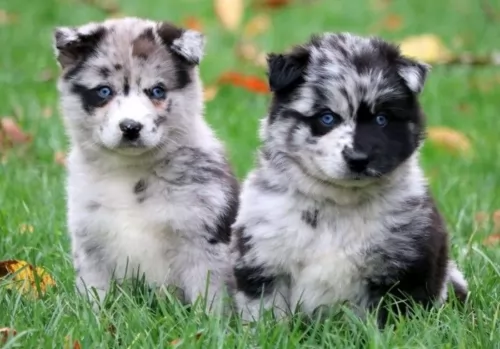 Your Husky and Pomeranian mix promises to be resilient in the face of illness if you feed him well and exercise him. Still, no dog is immune from the many common health issues there are that plague dogs.
Your Husky and Pomeranian mix promises to be resilient in the face of illness if you feed him well and exercise him. Still, no dog is immune from the many common health issues there are that plague dogs.
As a responsible dog owner, as soon as your pet is showing signs of being sick and in distress, you need to get him to the vet. Some common dog illnesses include bloat, cancer, skin allergies and hip dysplasia.
Bloat, also known as Gastric Dilatation and Volvulus:
This can be deadly for dogs, and when you see your dog’s stomach swollen and hard and he is restless and drooling, vet attention is required immediately.
The stomach is twisted and filled with gas that can’t escape. Pressure within the stomach puts pressure on other body organs and this can result in blood flow to the heart being stopped.
There are a number of theories as to why bloat occurs, but it is better to give your pet a couple of smaller meals a day instead of one large one which he gobbles up too quickly.
Its tempting to give your dog a piece of chocolate when he looks so pleadingly at you, but chocolate as well as other human foods can be toxic for your dog.
Chocolate has ingredients which are safe for human consumption but which can lead to a host of medical complications for your dog. Your dog may vomit, have rapid breathing, an increased heart rate and even seizures – it’s just not worth taking the chance.
 There isn’t too much information about inherited health problems with this dog and he can live to be 11, 12 or 13 years of age, maybe even longer.There are one or two health problems to be aware of -
There isn’t too much information about inherited health problems with this dog and he can live to be 11, 12 or 13 years of age, maybe even longer.There are one or two health problems to be aware of -
This condition occurs with the knee caps of the dog and either one or both back legs can be affected. Sometimes surgery will be required to help the dog.
Little dogs always battle with their teeth, and the Russian Toy Terrier can experience problems when the puppy or ‘milk’ teeth don’t fall out. It affects the development of adult teeth. Sometimes the vet even has to have the teeth removed.
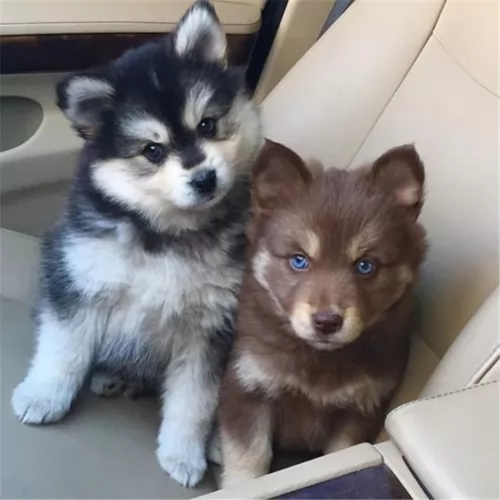 The thick coat sheds quite a bit so it will need to be brushed at least twice a week to keep it vibrant and shiny.
The thick coat sheds quite a bit so it will need to be brushed at least twice a week to keep it vibrant and shiny.
Nails will need to be trimmed regularly if they don’t wear down themselves. You will also need to check your dogs teeth when you brush him. A bad tooth can cause ill health that can damage the heart and kidney.
Your Pomsky is an energetic dog that requires a lot of exercise. While he will love a walk every day, they want more than that – loving to play ball- and frisbee games with all that energy.
Pomsky owners can’t be couch potatoes as this energetic dog will become bored, frustrated and destructive, and then an irresponsible owner blames the dog.
With so much energy, your Pomsky is going to require high quality food that ensures his energy levels remain high. Commercially manufactured dog foods can be wonderfully convenient, and the best ones can be excellent for your pet, with the right balance of vitamins and minerals.
High quality dry kibble can get a bit boring so add in some home-made food to the dry kibble to make it more interesting. Dogs thrive on simplicity, so boiled chicken, sweet potatoes, brown rice or pasta, carrots and spinach will be 100% sufficient for him. This can be chopped up into his dry kibble occasionally as a welcome treat.
Also, your pet will thrive on a bit of raw meat added in from time to time. Make sure he is never without a constant supply of fresh, cool water.
 The Russian Toy Terrier is a small breed and isn’t going to need too much exercise. However it will do him good to get out to sniff around, and a walk every day will be recommended.
The Russian Toy Terrier is a small breed and isn’t going to need too much exercise. However it will do him good to get out to sniff around, and a walk every day will be recommended.
Your Russian Toy Terrier is a fairly low maintenance dog and isn’t going to require specialist grooming. The little dog will simply require some occasional brushing to remove loose hair.
When you brush him, check inside his mouth for bad teeth as small dogs like this can suffer from pain with overcrowding of teeth.
Tiny though he is, the Russian Toy Terrier will need good food. It will be tempting to pop sugary treats into such a tiny little dog’s mouth. This can in fact be seriously dangerous for him, not to mention that he can become obese. This opens up anew set of health problems.
You can feed this little dog commercially manufactured food but it should be the best quality one for small breeds.
Give him some tasty homemade food too. Simply add into one big pot chicken, brown rice or pasta and spinach, sweet potatoes and carrots. This food can all be chopped up, refrigerated and added warmed up and in small portions to your tiny pets dry kibble once or twice a week.
A tiny bit of raw meat can also go a long way to ensuring his skin stays healthy and free of skin infections.
Ensure that there is always a bowl of fresh, cool water within his reach.